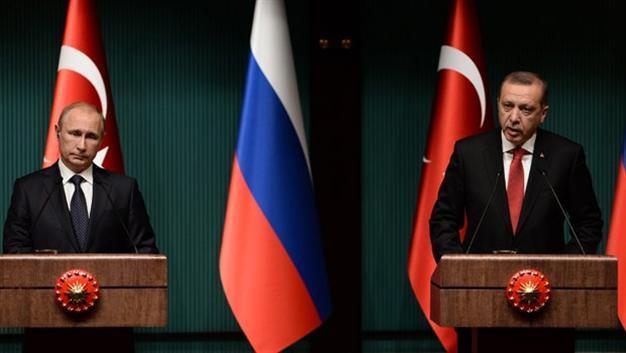Putin declares gas discount for Turkey, scraps South Stream
ANKARA
 Turkey and Russia have signed fresh documents in a bid to boost already growing economic, energy and trade ties, reiterating their ambitious mutual target to augment the bilateral trade volume to $100 billion by 2020.
Turkey and Russia have signed fresh documents in a bid to boost already growing economic, energy and trade ties, reiterating their ambitious mutual target to augment the bilateral trade volume to $100 billion by 2020. Led by President Recep Tayyip Erdoğan and Russian President Vladimir Putin and with senior officials from both sides, the lengthy Turkey-Russia High-Level Cooperation Council meeting produced key agreements in the fields of energy, banking, industry, nuclear energy training, justice and trade, in line with both side’s intention to strengthen and diversify economic ties.
“This visit of Putin is a clear sign of the progress of the relations between Turkey and Russia,” Erdoğan said in a joint press conference on Dec. 1. “Our political will to increase our trade volume to $100 billion is still valid.”
He added that they had studied in detail the pace of works for the $20 billion Akkuyu nuclear plant investment in a bid to speed up the accomplishment of the project. The two presidents also discussed the ongoing natural gas deal between the two countries, as Turkey is the second largest market for Russia.
For his part, Putin touched on Turkey's position as Russia’s second top trading partner after Germany. "Regarding our energy cooperation with our Turkish partners, we will make a six percent discount from January 1," he said.
Meanwhile, Putin warned that the project to build the South Stream Offshore Pipeline, which was already approved by Turkey as a transit country, could be cancelled if Bulgaria keeps failing to give the final approval.
Moscow later could build a new link and possibly work with Turkey on creating a gas hub on the border with Greece, Putin said. He argued that the EU’s opposition to the South Stream pipeline - which would have run under the Black Sea to Bulgaria and further on to southern Europe - meant Russia had no other choice but to scrap it.
Russia's state owned energy giant Gazprom separately announced late Dec. 1 that Moscow cancelled the the construction of South Stream. Instead, Russia will build a 63 billion cubic meter capacity natural gas pipeline to Turkey, bypassing Ukraine, said the company's CEO Aleksey Miller in a written statement.
Miller said that the 14 bcm capacity of the new pipeline will replace Ukrainian transit natural gas.
The pipeline will bring 50 bcm natural gas to an energy hub which will be built on the Turkey-Greece border. Russian President Vladimir Putin stated on Monday that Turkey and Russia have signed a memorandum of understanding to build the hub.
The beginning point of the new pipeline will be Russkaya Station, same as the South Stream project.
Turkey and Russia performed their 5th High-Level Cooperation Council meeting with the participation of numerous ministers from each side, after Erdoğan and Putin had a nearly one-and-half hour long tete-a-tete meeting. The Turkish team included the ministers of foreign affairs, economy, energy, labor, transportation and justice.
Turkey and Russia established the high-level cooperation council in 2010 to enhance economic, trade and energy ties. However, the two leaders did not refrain from voicing their disagreement over the situation in Syria this time.
After Putin said Syrian President Bashar al-Assad had shown he was "his people's choice" by winning elections, Erdoğan expressed his opposition.
"We see in other countries, like in Egypt, how coup-makers win elections," he said, stressing that polls are not conducted fairly in Syria.
"They ask who will replace al-Assad? We say that whoever the Syrian people choose," Erdoğan added, noting that "the making of conditions for a fair election is all that we need to do."
Çavuşoğlu meets Lavrov
Before the latest council meeting, the foreign ministers of the two countries, Mevlüt Çavuşoğlu and Sergei Lavrov, met at a working breakfast to review preparations for the council and to discuss regional developments, particularly in Syria and Ukraine.
The ministers agreed that Lavrov would officially visit Turkey in 2015 and discussed the timing of other high-level visits. Putin’s attendance at the G-20 Summit that will take place in the southern Turkish province of Antalya next year, and the removal of the secretariat of the Black Sea Economic Cooperation Organization, were also discussed by the two ministers.
Second guest
Russian President Putin became the second world leader to be hosted at Turkey’s new and massive presidential palace in Ankara after Pope Francis over the weekend. President Erdoğan met his guest at the door of the palace where an official welcoming ceremony took place. Putin had earlier visited the mausoleum of Anıtkabir and signed the Special Book, expressing Russia’s respect for Mustafa Kemal Atatürk, the founder of the modern Turkish Republic. As part of his lengthy meetings, Putin also met Prime Minister Ahmet Davutoğlu at the presidential palace before the official dinner.
Putin was set to leave Turkey after the official dinner given by Erdoğan in his honor on the evening of Dec. 1.
Outside the official meetings, representatives of various associations formed by Crimean Tatars living in Turkey protested Putin’s visit to Turkey.
















